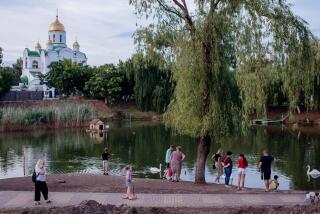Soviet Moldova, Secessionists Hold Talks : Ethnic unrest: Moscow sends troops to avert bloodshed as republic officials open a dialogue with a Turkic-speaking dissident minority.
- Share via
MOSCOW — Talks opened between Moldova’s government and a minority group bent on secession Saturday as the Kremlin ordered troops into the area to prevent ethnic grievances from escalating into bloodshed.
One day after Moldova clamped a state of emergency on the region where about 150,000 Turkic-speaking Gagauzi live, deputies from the southern Soviet republic’s parliament met in the town of Chimishliya with the self-styled “Provisional Committee of the Gagauz Republic.”
Those negotiations produced no immediate compromise on Gagauzi demands for autonomy or Moldova’s insistence on its territorial integrity. But they were the first real attempt at dialogue since the Gagauzi, claiming they were victims of Moldovan discrimination, proclaimed independence in August.
Grounds for worry remained, however, and even the Soviet government voiced its concern. According to officials in the republic--formerly called Moldavia--on the Soviet-Romanian border, as many as 40,000 nationalists bent on snuffing out the Gagauzi threat to Moldovan sovereignty gathered near the group’s strongholds, many spoiling for a fight.
According to Soviet press reports, “volunteers” armed with clubs and iron bars packed roads leading to the southern districts of Komrat and Chadyr-Lunga, where there are large numbers of Gagauzi, a predominantly Christian people that ethnographers believe came to Moldova from Bulgaria in the 18th Century while fleeing Turkish rule.
Telephone communications with the Gagauz area were also cut, and residents there were reportedly digging trenches for self-defense.
Both Gagauz and Moldovan leaders, however, seemed anxious to avert violence. Moldova’s president, Mirca Snegur, called on his compatriots to stop sending “volunteers” to challenge the Gagauzi, and Soviet television said he assured Moscow officials they would be dispersed.
Significantly, the Soviet government said both Snegur and Gagauzi leaders requested troops be dispatched the area to “increase protection for law and order,” apparently as neutral parties to keep the Gagauzi and the Romanian-speaking Moldovans apart.
The Kremlin, which has been criticized both for its actions and its inaction in the country’s many ethnic disputes, placed a Soviet Interior Ministry regiment in Kishinev, Moldova’s capital, under the command of the republic’s government, the official Tass news agency said.
Judging by its dispatch, Prime Minister Nikolai I. Ryzhkov has been put in charge while President Mikhail S. Gorbachev is visiting Spain and France, and he and his entourage were worried about what might happen in Moldova.
The Soviet leadership assesses the situation as “fraught with unpredictable consequences,” Tass reported.
Attempts by the Gagauzi to hold elections for their own parliament caused the showdown, as well as Friday’s decision by the Moldovan legislature to declare a two-month state of emergency in areas claimed by the “Gagauz Republic,” and shut down governmental bodies there.
The Gagauzi are only one of the concerns of Moldova’s leadership. Alarmed like the Gagauzi by a law passed this year that makes Romanian the republic’s official language, ethnic Russians, Ukrainians and other migrants in the east proclaimed the “Dniester Republic.”
Leaders of that would-be entity have expressed support for the Gagauzi, seeing in them allies against the Moldovans. Authorities, however, headed off their bid to help the Gagauzi by halting a convoy of several dozen vehicles as they ferried “volunteers” from the predominantly Russian city of Tiraspol to Komrat in the Gagauz area, Tass said.
More to Read
Sign up for Essential California
The most important California stories and recommendations in your inbox every morning.
You may occasionally receive promotional content from the Los Angeles Times.













